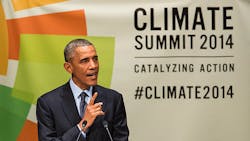PARIS -- Having renewed their commitment to saving Earth's climate, governments face daunting challenges in the coming months to draft a global pact and set targets for slashing carbon emissions, analysts said Wednesday.
Important signals went out Tuesday from a special summit of political leaders and corporate bosses hosted by UN chief Ban Ki-moon in New York.
But action is still falling short of meeting the trumpeted goal of averting dangerous climate damage, the analysts said.
The UN is seeking to limit global warming to two degrees Celsius (3.6 degrees Fahrenheit) over pre-Industrial Revolution levels -- but scientists say on current trends, the global average could reach twice that.
"The almost universal reaffirmation of a commitment to limit warming below 2 C by leaders at the summit, along with virtually no new commitments to reduce emissions from the 4 C path we are on, places enormous pressure now on the next six months," said Bill Hare, director of the Berlin-based think-tank Climate Analytics.
Under the UN plan, a climate deal must be sealed in Paris at the end of 2015 and take effect from 2020.
But two huge hurdles have to be overcome by then.
In Lima in December, countries will seek to hammer out a common format for national pledges, and draft the outlines of the global agreement. Then, in the first quarter of 2015, countries must start putting their pledges on the table so that climate poker can begin in earnest.
Nations have been squabbling for more than two decades over sharing the burden of curbing emissions, which requires a costly shift away from fossil fuels to cleaner energy sources.
On Monday, the Climate Action Tracker (CAT), a monitor of countries' climate policies, confirmed the world remained on track for warming of about 3.7 C by 2100 -- a level the experts think will drive perilous floods, drought, storms and rising seas.
Climate Back on Radar
But there was also cause for hope, with thousands of people turning out for marches and protests worldwide on Sunday to demand urgent action on climate change.
And observers like Meyer pointed to "a positive attitude and atmosphere" among the leaders gathered in New York that could drive compromise so that the Paris meeting, unlike the Copenhagen summit of 2009, goes smoothly.
The summit saw business- and city-level vows to reducing emissions.
But observers highlighted a statement by China, the world's biggest greenhouse-gas emitter, that it wanted absolute emissions to peak as early as possible -- a potential game-changer.
"All of the commitments described in terms of greenhouse gas emissions by national governments are not new and have been made in other contexts," said Niklas Hoehne, director of energy and climate policy at the Ecofys consultancy.
And those announcements that were made "do not yet present a step change" towards 2 C, he warned.
Nations still disagree about who has to do what to curb emissions, with developing countries arguing the West has a historical responsibility to do more.
The West, meanwhile, points the finger at emerging giants like China and India, whose emissions have soared in the past decade alongside their populations and economies.
Nations also disagree about the legally binding nature of the deal, what must be included in it, and how countries' policies and actions towards reaching emissions targets will be monitored.
Another vexed issue is money. Wealthy economies have promised to muster $100 billion a year by 2020 in help for climate-vulnerable poor countries.
Some funds were pledged Tuesday to the Green Climate Fund (GCF), the main vehicle for administering this -- but, at a total of $2.3 billion, a lot more will be required for developing nations to be assured of the support of wealthier countries.
"The real test of this (UN) summit now lies ahead of us: was it just a talkfest or will it lead to the major increases in ambition needed?" said Hare.
- Mariette Le Roux, AFP
Copyright Agence France-Presse, 2014
About the Author
Agence France-Presse
Copyright Agence France-Presse, 2002-2025. AFP text, photos, graphics and logos shall not be reproduced, published, broadcast, rewritten for broadcast or publication or redistributed directly or indirectly in any medium. AFP shall not be held liable for any delays, inaccuracies, errors or omissions in any AFP content, or for any actions taken in consequence.
